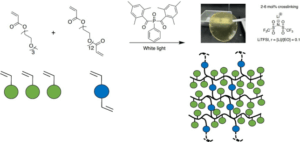ANN ARBOR, MI
A collaborative team led by Dr. Shailesh Joshi, Dr. Tim Arthur, Prof. Chris Evan, and Prof. Paul V. Braun at the University of Illinois Urbana-Champaign has unveiled a new class of solid-state polymer electrolytes (SPEs) that could advance lithium-ion battery technology. Published in Journal of Polymer Science, their work tackles the longstanding challenge of balancing ionic conductivity and mechanical stability in polymer-based electrolytes.
The researchers engineered crosslinked acrylate networks featuring ethylene oxide (EO) side chains, synthesized through white-light-initiated polymerization. By varying the crosslink density from 2% to 6%, they created a range of materials with tunable mechanical and ionic transport properties. Rheological studies revealed intriguing strain-dependent behaviors: in dry networks, higher crosslink densities led to a pronounced overshoot in the loss modulus at lower strains, indicating increased stiffness. Interestingly, salt-containing networks exhibited greater strain tolerance due to transient ionic crosslinks, a phenomenon that became more prominent with additional crosslinking.
Electrochemical tests showed a delicate tradeoff—while increased crosslinking slightly reduced ionic conductivity, the 2% crosslinked network still achieved impressive conductivity levels. Adding propylene carbonate further boosted conductivity without compromising structural integrity. This research highlights how acrylate-based polymer networks can be finely tuned to meet the dual demands of ion transport and mechanical resilience, paving the way for safer, flexible solid-state batteries.
Please see the complete work published in Journal of Polymer Science

